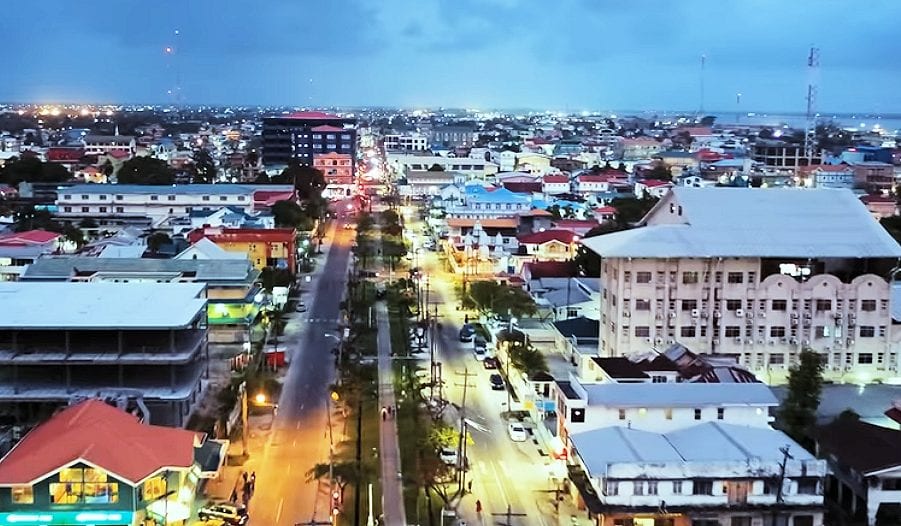(Bloomberg) When Exxon Mobil Corp. came to Guyana, the U.S. oil giant brought with it the promise of extraordinary economic growth. Now the tiny South American country is embroiled in a bitter battle over who might control that wealth just as the crude starts to flow.
In November, the International Monetary Fund gave Guyana the nod as the world’s fastest growing economy on the strength of Exxon’s oil finds. Since then, a fight for political control has led to a disputed election that’s spurring calls for international sanctions as a price rout subverts the nascent oil boom and a killer virus settles in.
Together, the three events are spurring rising concern over the future of both Guyana and Exxon within a nation politically split along sharp racial lines. The danger: With the government’s legitimacy at issue, Guyana risks limiting its oil riches and becoming another Venezuela, a neighboring country that’s an economic and humanitarian disaster zone.
“This is the first step of the oil curse,” said Schreiner Parker, the vice president for Latin America at consultant Rystad Energy, citing the political clash. ” The first thing that you can do wrong has been done wrong.”
President David Granger is accused of miscounting votes to stay in office and fighting a recount even after the U.S. and regional groups said the March 2 vote was flawed. Diplomats from the U.S., European Union, U.K. and Canada recently quit an attempted recount, saying the process wasn’t credible.
They warned in a joint statement that Guyana, a nation with fewer people than Columbus, Ohio, risks “isolation” from the international community as a result.
Sanctions Push
A spokesman for Granger said there is “no evidence” of fraud in the election, and that recount was blocked by the courts not the president. But Granger’s challenger, Bharrat Jagdeo, said his supporters won’t recognize Granger as president, “and we will not participate in the parliament.” Instead, they will work with the international community and push for sanctions.
“Just when we thought we were moving forward as a country; this happens and taints us for years.” Jagdeo said in a telephone interview.
Exxon, meanwhile, continues to see Guyana as its golden ticket in tough times, with billions of barrels of oil at play.
The company is accelerating drilling at a cost that remains profitable even after the biggest price crash since the 1980s, and its partner, New York-based Hess Corp., said in January it expected to sell its first cargo of oil from Guyana this month. Output from the project will escalate in coming months to 120,000 barrels a day, while Exxon has forecast it will produce at least 750,000 barrels a day by 2025.
“We are invested in a long-term, mutually beneficial relationship with the people of Guyana,” Exxon said in an emailed statement.
The sheer size of the oil reserves — pegged at around 8 billion barrels — suggests that Guyana’s annual gross domestic product, now sitting at about $4 billion, will expand to about $15 billion by 2024, according to IMF estimates. This at a time when the average income in Guyana is just $385 a month.
It’s a level of newfound wealth that’s served to widen the split between Jagdeo’s People’s Progressive Party, which is supported primarily by the Indo-Guyanese people, and Granger’s People’s National Congress, supported mainly by Afro-Guyanese residents.
“People are suspicious and fed up on both sides,” said Nicholas Deygoo, president of the Chamber of Commerce, speaking by telephone from Georgetown, the country’s capital.
Gavin Singh, a Guyana-based investment banker, said the people he talks with are both “scared and concerned.” The Guyanese are “a resilient people,” he added. “We’ve been through hard times before. As much as people are concerned, they’re also hopeful. They just want this to be over with, whatever the outcome.”
Guyana — with about 780,000 people — is Exxon’s second-biggest growth project after the Permian Basin in the U.S., and the first group of offshore wells are profitable even after the biggest price rout since the 1980s, according to energy consultancy Wood Mackenzie Ltd. While Exxon was one of the first oil majors to announce spending cuts in response to the price crash, including in the Permian, its Guyana operation is expected to keep moving forward.
Exxon’s partner, Hess Corp., excluded Guyana from its cuts to capital spending earlier this month, indicating the project will continue as planned despite the crash in oil prices.
“For a project of this magnitude, and considering it is deepwater, it is one of the best,” said Marcelo de Assis, the head of Latin American upstream research at Wood Mackenzie. “Guyana is still attractive for investment. The external environment should curb any increase in government take. This is not a time to toughen up fiscal terms.”
Still, if the domestic political crisis drags on at a time when a global pandemic and a price war are forcing companies across the world to their knees, Exxon could quickly run into problems with paying for its oil production, according to Rystad’s Parker. The entire offshore oil industry is struggling with how to staff offshore facilities amid the coronavirus pandemic, and Guyana’s remote location makes this issue even more difficult, he said.
Guyana has had four cases of the virus, according to the World Health Organization. In response it’s advised limiting social contact and closed some facilities.
There was “real panic” when the first case surfaced, according to Singh, with lines forming outside of supermarkets and pharmacies. Now “we just want our lives to go back to some sense of normality,” Singh said. “To be able to shop and look at each other with a sense of security.”
Bloomberg: By Kevin Crowley and Peter Millard



